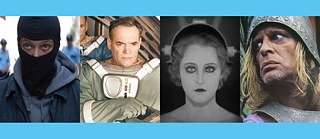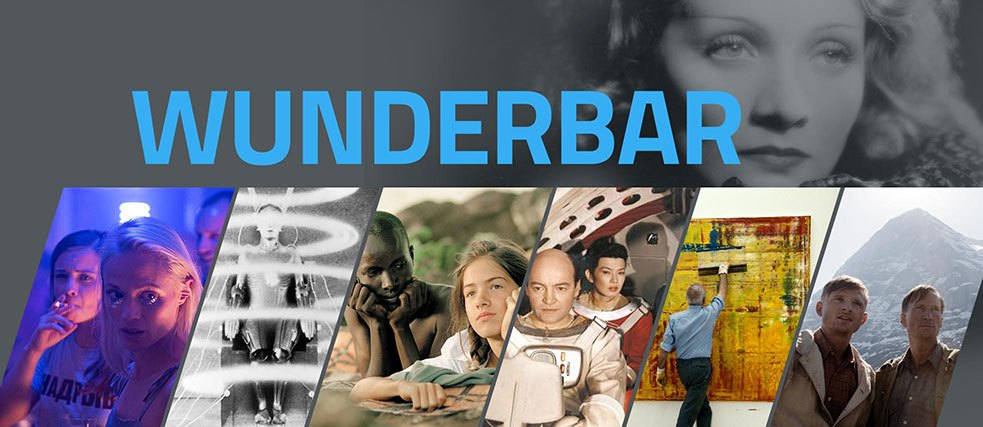Event series
Wunderbar Films: German Cinema 101

As part of the 2018-2019 initiative "Year of German-American Friendship (Deutschlandjahr)," encompassed by the motto #WunderbarTogether, the Goethe-Institut Washington and the Landmark West End Cinema invite you to German Cinema 101: a year-long series of once-monthly film screenings that explore four distinct eras of German film history. All screenings will be followed by discussions led by local film experts to encourage a deeper examination of German cinema in the present and past.
German Cinema 101 is part of the project "Wunderbar: A Celebration of German Flim." From Beloved Sisters to A Coffee in Berlin and Young Goethe in Love, from The Blue Angel to The Cabinet of Dr. Caligari - we are celebrating German-American friendship with our partner Kanopy by bringing 48 German films to your screens.
Since the inception of cinema, Germany has consistently been a source of influential and innovative creative output in the film industry. From the silent films of the 1920s came the "first horror film," The Cabinet of Dr. Caligari, as well as the "first science-fiction film," Fritz Lang’s epic Metropolis. Germany’s complex history has played a large role in the evolution of German cinema; the films of the struggling early-20th-century Weimar Republic reflect a highly experimental approach to envisioning dreamlike worlds, parallel dimensions, and dystopian futures.
During the height of the Cold War, East German filmmakers from the 1960s and 1970s found subtle ways to criticize Soviet rule using films produced at DEFA Studios — from drawing parallels between the German Democratic Republic and the Spanish Inquisition, to mirroring the terror of potential nuclear war with stories of space travel and extraterrestrial enemies. On the other side of the Berlin Wall, New Wave filmmakers like Werner Herzog, Wim Wenders, and Rainer Werner Fassbinder questioned power structures of postwar West Germany and challenged the BRD‘s relationship to its recent past with experimental camerawork and unconventional narrative approaches.
Present-day German cinema celebrates a variety of storytelling perspectives from diverse filmmakers of all genders and backgrounds, exploring topics of class, gender, and nationality using gritty urban settings and intertwining narratives.
For the next three film screenings of German Cinema 101, we will be taking a closer look at Weimar German cinema with Robert Wiene’s The Cabinet of Dr. Caligari, Fritz Lang’s Metropolis, and F.W. Murnau’s Faust. These film screenings will involve discussions guided by Peter Pfeiffer of Georgetown University (first two films) and Sky Sitney of Georgetown University (third film).

Admission to each film is $5 through Eventbrite. Admission is free for all currently enrolled in a German course at the Goethe-Institut Washington; tickets are available at the front reception desk. All films have English subtitles.
Beginning with contemporary German cinema, the following films were screened in 2018:
October 8, 2018, 6:30 PM – Victoria (2015), dir. Sebastian Schipper
November 12, 2018, 6:30 PM – The Edge of Heaven (Auf der anderen Seite) (2007), dir. Fatih Akin
December 10, 2018, 6:30 PM – Hannah Arendt (2012), dir. Margarethe von Trotta
The following films will be screened in 2019.
Films of the German Democratic Republic (DEFA Studios)
January 14, 2019, 6:30 PM – Goya (1971), dir. Konrad Wolf
February 11, 2019, 6:30 PM – The Silent Star (Der schweigende Stern) (1960), dir. Kurt Maetzig
March 11, 2019, 6:30 PM – Trace of Stones (Spur der Steine) (1966), dir. Frank Beyer
Films of the Weimar Republic (1920s)
April 8, 2019, 6:30 PM – The Cabinet of Dr. Caligari (Das Cabinet des Dr. Caligari) (1920), dir. Robert Wiene
May 13, 2019, 6:30 PM - Metropolis (1927), dir. Fritz Lang
June 10, 2019, 6:30 PM – Faust (1926), dir. F.W. Murnau
Films of New German Cinema (1970s)
July 8, 2019, 6:30 PM – Alice in the Cities (Alice in den Städten) (1974), Wim Wenders
August 12, 2019, 6:30 PM – The Marriage of Maria Braun (Die Ehe der Maria Braun) (1979), dir. Rainer Werner Fassbinder
September 9, 2019, 6:30 PM – Aguirre the Wrath of God (Aguirre der Zorn Gottes) (1972), dir. Werner Herzog
-
German Cinema 101: Victoria
6:30 PM | Wunderbar Films
-
German Cinema 101: The Edge of Heaven (Auf der anderen Seite)
6:30 PM | Film
-
German Cinema 101: Hannah Arendt
6:30 PM | Film
-
German Cinema 101: Goya or the Hard Way to Enlightenment (Goya – oder der arge Weg der Erkenntnis)
6:30 PM | Film
-
German Cinema 101: The Silent Star (Der schweigende Stern)
6:30 PM | Film
-
German Cinema 101: Trace of Stones (Spur der Steine)
6:30 PM | Film
-
German Cinema 101: The Cabinet of Dr. Caligari (Das Cabinet des Dr. Caligari)
6:30 PM | Film
-
German Cinema 101: Metropolis
6:30 PM | Film
-
German Cinema 101: Faust
6:30 PM | Film
-
German Cinema 101: Alice in the Cities (Alice in den Städten)
6:30 PM | Film
-
German Cinema 101: The Marriage of Maria Braun (Die Ehe der Maria Braun)
6:30 PM | Film
-
German Cinema 101: Aguirre, the Wrath of God (Aguirre, der Zorn Gottes)
6:30 PM | Film